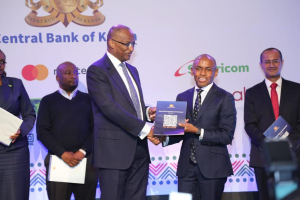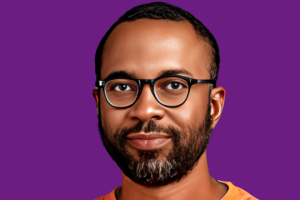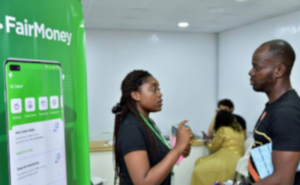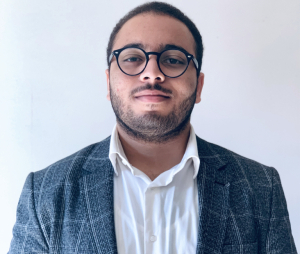Grey provides banking services to African digital nomads
The fintech company, originally known as Aboki, has evolved into a full-fledged neobank that provides banking services to unbanked individuals.
Grey is a fintech solution developed by an eponymous Nigerian start-up. It provides digital banking services such as current account opening, debit card issuance, and loans. It also offers free virtual international bank accounts to let African teleworkers get paid easily.
Its main objective is to provide adequate financial services to everyone. For that purpose, it developed a mobile app that is available on Playstore and AppStore. Through the app, users can sign up for a Grey account and access the various services.
In 2022, the fintech startup behind the solution was claiming 100,000 users and a 200% growth in the volume of transactions processed. Currently, the Android version of its app has been downloaded over 100,000 times from PlayStore, demonstrating a certain popularity. It is growing rapidly and has won several awards. In 2022, it was selected to join the Winter cohort of California-based accelerator Y Combinator. In addition to Nigeria, it is present in Kenya and Tanzania and hopes to continue its expansion into other African markets.
Since its launch in 2020, it has raised about $2.5 million to support its growth, among other things. “We like to say that we’re on a mission to make international payments as easy as sending an email. We want to do impactful work to improve how Africa as a continent interacts with money across its borders,” said its CEO Idorenyin Obong when Grey raised $2 million in 2022.
Adoni Conrad Quenum
Kenya: CBK launches QR code standard to promote digital payments
The QR code technology was democratized in the 2000s but, it recently gained popularity in the Covid-19 period that facilitated the boom of the contactless economy. By adopting the technology, Kenya joins the few African markets that have standardized QR code usage to facilitate payments.
Last Wednesday, the Central Bank of Kenya (CBK) launched the "Kenya Quick Response (KE-QR) Code Standard 2023" aimed at improving digital payment services.
According to CBK governor, Dr. Patrick Njoroge, “the payment system will provide Kenyans with additional secure payment solution methods, increasing usability and consumer adoption of digital payment channels.”
The launch of the KE-QR Code Standard 2023 is one of the several initiatives taken by the CBK under its 2022-2025 National Payment Strategy to support the adoption of key standards and align Kenya's national payment system with global standards.
The effective implementation of the standard and the use of standardized QR Code payments will enable customers to make digital payments in a simple, fast, convenient, and secure manner using the QR code as opposed to the manual system used in the past. It will also promote financial inclusion by allowing institutions of different sizes and customer focus to
By effectively implementing the standard and utilizing standardized QR Code payments, customers can conveniently, quickly, securely, and easily make digital payments using the QR code instead of the manual payment system used in the past. Additionally, it will enhance financial inclusion by enabling institutions of various sizes and customer focus to expand the adoption of digital payments.
QR Code is a universal technology that can be scanned by specialized equipment and apps like the MPESA mobile app and banking apps similar to the ones offered by Equity Bank and the CBK. Thanks to the new standard, merchants can now have QR codes that contain their details as well as the unique identifiers of payment service providers. This technology also provides information about the transaction that has taken place.
Samira Njoya
Nigeria: Tayo Oviosu builds an ecosystem for accessible financial services
He is one of the entrepreneurs revolutionizing the African fintech industry. He founded the fintech company Paga Group, which provides innovative mobile payment solutions to Nigerians.
Nigerian-born Tayo Oviosu (photo) is a Standford University Graduate and one of the first fintech entrepreneurs in the African tech ecosystem. In 2009, he founded Paga Group, a fintech company that aims to offer a mobile payment solution accessible to every Nigerian regardless of income group. His company enables users to carry out online transactions, pay bills, and access several financial services from their phones.
“One of my main focuses when starting the company was, how do I get the market woman in Ajegunle [ ed. note: one of the most vulnerable neighborhoods in Lagos] to use this. [...] Our ambition is that one billion people should use this platform to access and use money. We want to particularly focus on the emerging middle class – helping them to pay, and helping them to get paid,” he explained in 2021.
With over 19 million registered users and more than 27,000 agents across Nigeria, Paga has quickly become one of the market leaders in financial technology in Africa. Tayo Oviosu has worked with partners such as Untapped Global and Visa to expand his company's capabilities and provide innovative payment solutions to users.
The tech entrepreneur also co-founded Kairos Angels, a company that invests in business founders who are obsessed with changing the world. His professional career began in 1999 at Deloitte Consulting where he was a senior consultant.
In 2004, he worked for Lucent Technologies for three months as a business development summer associate. The following year, he joined Cisco Systems as manager of acquisitions and venture capital investments. In 2008, he was appointed Vice President at Travant Capital Partners, a venture capital and private equity firm. He worked there for five months.
He has been recognized for his work in entrepreneurship and financial inclusion. In 2013, he was nominated for the West African Entrepreneur of the Year at the All African Business Leaders Awards. In 2015, the African Leadership Network selected Paga Group as the Outstanding Growing Company of the Year in Africa.
Melchior Koba
Zambia: Lupiya offers microloans to businesses and individuals
The fintech startup, founded in 2016, accessed venture financing in 2020. Since then, it has become somehow unstoppable despite the coronavirus pandemic and the small size of its domestic market.
Lupiya is a fintech solution developed by a Zambian startup. It allows easy access to microloans for individuals and businesses. The startup behind it was founded, in 2016, by Evelyn Chilomo Kaingu and Muchu Kaingu. Based in Lusaka, its goal is to expand access to credit and reduce the cost of borrowing for all Zambians.
“We aim to level the playing field for all Zambians by offering low-cost lending products and attainable options for security. We distance ourselves from traditional lenders by being accessible to marginalized and unbanked communities and offering lending practices that are transparent and fair,” the startup says on its web platform.
Currently, it has no mobile app so everything happens on its web platform. On the platform, a user can fill out a form stating the desired loan amount or loan type and the estimated repayment duration to check eligibility. Once the startup replies, the user can then proceed with account creation, upload the required documents and apply for the loan.
Once the loan is processed, users are always notified. The startup charges up to 59 percent interest on its loans.
According to its CEO, Evelyn Kaingu, it started with just $500. That amount was lent to “a small community”, from there on, things moved with the startup acquiring its first hundred clients, and then more.
Since its launch, It has raised over $2.5 million to accelerate its growth in Zambia. It has helped smallholder farmers boost yields, improve soil health and reduce greenhouse gas emissions. These efforts caught the attention of Kamala Harris, Vice President of the United States of America, during her visit to Zambia in late March 2023.
Adoni Conrad Quenum
Nigeria: Carbon offers digital banking services
The fintech solution was launched by founders with over 20 years of experience in the African financial sector. With their experience in the industry, they know the challenges faced by populations when accessing the services offered by traditional financial institutions. So they set Carbon to address those challenges.
Carbon is a fintech solution developed by the Nigerian start-up OneFi. It allows access to digital banking services. The startup behind the solution is based in London and Lagos. Founded in 2012 by Chijioke Dozie and Ngozi Dozie, it has raised over $15 million in VC funding to accelerate its growth in Africa.
Through its mobile app -available for Android and iOS devices, users can register their account in just a few minutes and start accessing its services. Carbon also has a USSD code for potential users living in areas with no or poor access to the internet.
Among other things, the fintech allows users to pay bills, transfer money or get loans instantly. It has even integrated a feature that allows users to exchange messages when closing deals.
Every deposit on the platform is insured by the Nigeria Deposit Insurance Corporation. In other words, the insurance company protects depositors and guarantees the settlement of insured funds should the fintech solution become unable to refund deposits. In 2021, it signed a contract with Visa to issue digital and physical debit cards.
“Carbon is focused on delivering an unparalleled banking experience that is both safe and reliable across all touchpoints.[...] We want more customers to enjoy some of our popular products like Carbon Zero through their Carbon card, and the key to achieving this is our partnership with a leading payment and fintech-friendly company like Visa,” said Chijioke Dozie at the time.
In 2020, the fintech claimed about 659,000 customers and over $241.35 million in transactions processed. In addition to Nigeria, Carbon has a presence in Kenya and Ghana. Its ambition is to become a pan-African digital bank for Africans and the diaspora. The Android version of its app has already been downloaded more than a million times.
Adoni Conrad Quenum
Nigeria: Rouzo provides financing to unbanked businesses
In Africa, under banking is a key issue. It greatly affects merchants, but tech entrepreneurs are gradually stepping in to solve it.
Rouzo is a fintech solution developed by Nigerian startup Owafara Fintech Services. It allows small businesses access to loans provided by individuals and other businesses. The solution is in line with Owafara Fintech Services’ goal of empowering more than 1 million small businesses in Africa with the funding and support that will allow them to grow, become self-sufficient, and add value to the economy.
“Rouzo is a portfolio managed platform that allows smart individual and corporate investors to invest in portfolios that are used to provide financing for small businesses.[…]By investing on Rouzo, investors generate a healthy return and contribute to economic development by empowering small businesses to grow and expand,” the platform explains.
Via its web platform, users can create their accounts to access the services offered by Rouzo. Individuals can invest funds in Rouzo, which will lend them at attractive rates to micro and small businesses that meet the necessary requirements. The interest generated by these loans will be shared between the fintech and the individuals who deposited their money.
Thanks to Owafara's expertise, Rouzo can easily get businesses that want to work with it evaluated. The fintech company has a special preference for women-owned businesses because it was itself founded by a woman. " As a female-founded Company, we also understand how women relate with finance and we are especially committed to helping women who are majorly underserved get access to loans and business support to grow," Rouzo explains.
" Eighty percent of our current loan book is to unbanked women micro-entrepreneurs," said Owafara Fintech Services’ founder in 2022. Rouzo claims more than 150,000 completed transactions and nearly 5 billion naira (about $10.9 million) lent. In 2021, it was one of 16 companies selected in the first cohort of the ShEquity Business Accelerator (SHEBA). In 2022, the institution helped the startup raise funds for its goals. The amount of the deal was, however, not disclosed.
Adoni Conrad Quenum
Trevor Gosling offers business funding in South Africa
He is a chartered accountant whose professional career includes positions at multinational corporations. He founded the fintech company Lulalend to allow access to quick and transparent business funding for SMBs.
Trevor Gosling (photo) is a South African chartered accountant who graduated from the University of Pretoria, where he studied from 2000 to 2004. He is also a tech entrepreneur. In 2014, he co-founded the financial technology startup Lulalend, which provides South African businesses with the funds they need to grow.
His startup offers up to US$280,000 in business financing to businesses that have been in operation for at least a year and have monthly sales of about US$2,200. The startup has developed a system that uses various data points to analyze loan applicants' financial health, business model, and cash flow potential to enable sound credit decisions.
In February 2023, the startup completed a US$35 million Series B funding round. The financial resources are expected to help expand its operations in South Africa and commercialize new products to improve access to financing for more than 2 million formal and informal small and medium-sized enterprises (SMEs) in the country.
" With this additional capital available, and the support of our investors, we are now better placed than ever to deliver on our vision of driving financial inclusion and acting as a catalyst for growth across the SME sector. […] I’m incredibly excited about the future of Lulalend and the positive impact we can have on South Africa’s SMEs, which as we know are so crucial to the nation’s economic development," Trevor Gosling said.
Before Lulalend, in 2012, Trevor founded 5 ounces, an e-commerce platform specializing in wine and gourmet products. The platform was acquired by Naspers Group in May 2013 but the founder remained its CEO until 2014.
His professional career started in 2005, at KPMG which employed him as a senior accountant. In 2008, he joined Rand Merchant Bank as an investment banker. In the following years, he assumed the same position at Goldman Sachs before returning to Rand Merchant Bank, in 2010, as a structured finance specialist.
Melchior Koba
Nigeria : FairMoney allows access to instant and collateral-free loans
In Africa, traditional financial institutions are usually unable to meet the needs of part of the population. This creates a great funding gap that tech entrepreneurs are trying to bridge with innovative solutions.
FairMoney is a fintech solution developed by a Nigerian startup, which aims to "build the leading mobile bank for emerging markets." It allows its users access to instant collateral-free loans.
"Banks stayed apart from this untapped market because of the lack of digital tech expertise to serve people with limited revenues in remote areas. […] We leverage digital technologies to offer financial services to people, even for very small transactions and loans, in remote areas. [...] We hit a US$93 million disbursement volume in 2020, despite COVID-19 which impacted lending businesses," said Laurin Hainy, CEO of FairMoney.
Through its Android app, users can create a FairMoney account by filling the required form. They specifically need the telephone number linked to their Bank Verification Numbers.
Once they create the account, they can link a bank account or card to that account and start receiving loans. The startup requires no documentation but, it is worth mentioning that thanks to the BVN, it can identify its users. In its FAQs, the startup explains that it "collects and processes securely data from your phone (SMS, device details, location, phonebook) to make a lending decision. This data is necessary for us to approve your loan in real-time without asking you for cumbersome paperwork." Since the launch of its instant loan solution, the startup has attracted thousands of users. Playstore stats show the Android app has been downloaded more than 10 million times.
Adoni Conrad Quenum
Nigeria: Anchor eases the development of banking products and services
In recent years, fintech companies have driven the growth in venture financing in the African tech ecosystem. They attract billions of dollars, encouraging tech entrepreneurs to develop solutions adapted to local realities.
Anchor is a fintech solution developed by a Nigerian startup, allowing users to create financial products and services.
"We built Anchor to abstract away the complexities in building financial products, so businesses can get started in five minutes with a few lines of code. […] We have seen first-hand the painful process of closing banking partnerships, negotiating third-party contracts, and obtaining regulatory approvals. And more generally, the extensive time and effort required to launch financial products," explains Anchor co-founder Segun Adeyemi.
The fintech solution provides the infrastructure, the tools, and the documentation that can help developers easily develop financial products (KYC, fund transfers, account opening, etc) in minutes.
Anchor also offers flexible functionalities companies need to improve international performance. It also facilitates complicated financial operations. In 2022, it was selected to join the summer cohort of startup accelerator Y Combinator. This allowed it access to US$500,000 financing and access to an international pool of investors.
Adoni Conrad Quenum
Morocco: Reda Hachimy helps clients optimize their portfolio
He embarked on entrepreneurship early while still working for financial institutions. His fintech aims to provide clients with automated tools to manage investments in several instruments and asset classes.
Reda Hachimy (photo) is a Moroccan entrepreneur and the founder/CEO of fintech startup Capital Quant Agency, which specializes in financial and capital markets.
Capital Quant Agency, founded in 2019, provides financial institutions, trading rooms, asset managers, and institutional investors with a powerful capital and financial markets decision-making software SaaS adapted to their specific needs. Its software helps clients evaluate investment opportunities and optimize their portfolios.
" Capital Quant Agency's main mission as an innovative startup is to develop for its clients, notably trading rooms and asset managers, a powerful, scalable, and modular capital market SaaS software that will help them achieve improved operational and strategic performance," Reda Hachimy said in December 2022.
In May 2022, he founded "Annuaire des consultants," an exclusive network of French-speaking consultants, consultancy firms, and experts. The online directory aims to showcase its members and improve their visibility with institutions seeking experts for their projects. Doing so, it expects to help members land impactful missions in Morocco and abroad.
The founder's professional experience consists of stints with financial institutions. In January 2020, he worked for the Moroccan Interprofessional Pension Fund as a data scientist. In February 2021, he also worked as a quantitative analyst for the investment bank Valoris Group. From February to April 2021, he worked in the markets division of Citibank.
Let's note that in 2022, Capital Quant Agency was crowned Africa's WealthTech Company of the Year and Best FinTech Solutions Provider in the MENA region.
Melchior Koba











